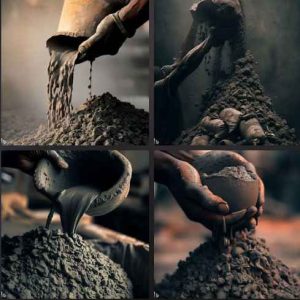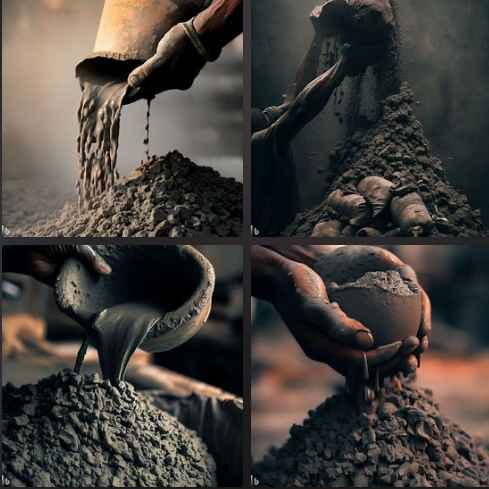Cement, the backbone of any building project, is a binding substance used in construction. It’s made by heating limestone and clay to high temperatures, creating a material called clinker, which is then ground into a fine powder. Simple, right? But its importance to Nigeria cannot be overstated.
The Role of Cement in the Nigerian Construction Industry
Cement is the literal foundation of any building in Nigeria, and a key material in roads, bridges, and dams. It’s the difference between a structure that stands strong and one that falls.
Key Players in the Nigerian Cement Market
Now, let’s look at who’s who in the Nigerian cement scene.
Dangote Cement
No discussion about cement in Nigeria would be complete without mentioning Dangote Cement. They’re the biggest player in the market, holding a significant share and offering high-quality cement products.
Dangote Cement usually costs between NGN 2,500 and NGN 3,000 per 50kg bag.
Lafarge Africa
Next, we have Lafarge Africa. Known for their consistency in quality, Lafarge Africa holds a substantial part of the Nigerian cement market.
Lafarge Cement is priced at approximately NGN 2,600 to NGN 3,100 per 50kg bag.
BUA Cement
Lastly, BUA Cement, a younger company, but already making a name for itself with its premium quality products.
BUA Cement, another local heavyweight, retails for around NGN 2,550 to NGN 2,950 per 50kg bag.
Factors Influencing Cement Prices in Nigeria
Ever wondered why cement prices fluctuate? Let’s dive in.
Production Costs
From the cost of limestone and clay to the expense of running large industrial kilns, production costs significantly influence the price of cement.
Demand and Supply
Like any other product, the laws of demand and supply apply to cement. High demand, limited supply? Expect prices to soar.
Government Policies
Government decisions, like changes in taxes or import laws, can also cause cement prices to fluctuate.
How to Choose the Right Cement for Your Construction Needs
Price is important, but it’s not everything.
Cement Quality
The higher the quality of cement, the stronger and more durable the structure.
Brand Reputation
Consider the brand’s reputation. Do they have positive reviews? Have their products been consistent over time?
Price Comparison
Finally, compare prices. More expensive doesn’t always mean better.
Future Outlook of Cement Prices in Nigeria
The future of cement prices in Nigeria depends on factors such as production costs, market dynamics, and government policies. It’s a bit like looking into a crystal ball.
Conclusion
In this guide, we’ve unraveled the complex world of cement prices in Nigeria. From production to purchase, numerous factors can influence the price. And while we can’t predict the future, we can stay informed and make the best decisions possible.
ALSO SEE: How Much Is Dangote Cement In Nigeria Today?

Frequently Asked Questions
-
Why is cement important in Nigeria?
Cement is crucial in Nigeria because it is a key material used in the construction industry. It forms the foundation of all kinds of buildings, roads, and infrastructure, playing a significant role in the country’s development.
-
Who are the main players in the Nigerian cement market?
The main players in the Nigerian cement market are Dangote Cement, Lafarge Africa, and BUA Cement.
-
How does the quality of cement affect its price?
Higher-quality cement usually comes at a higher price because it provides better durability and strength, thus requiring fewer repairs and offering long-lasting performance.
-
What role does the government play in setting cement prices?
The government can influence cement prices through policies, regulations, and taxes. For instance, import restrictions or subsidies can significantly impact the price of cement.
-
Why do cement prices vary across different brands?
Cement prices vary across brands due to factors like production costs, quality, brand reputation, and market positioning. Some brands may also offer specialized products at premium prices.
-
How can I ensure that I’m getting good quality cement?
You can ensure good quality cement by buying from reputable brands, checking for quality certification, and considering feedback from industry professionals.
-
Are there alternatives to cement in construction?
Yes, alternatives to cement in construction include fly ash, slag cement, and geopolymer concrete, among others. However, their usage often depends on the specific requirements of a project.
-
How does cement production impact the environment?
Cement production can have significant environmental impacts, including high energy consumption, greenhouse gas emissions, and depletion of natural resources.
-
Is it cheaper to buy cement in bulk?
Typically, buying cement in bulk can be more cost-effective, as many suppliers offer discounts for large orders.
-
Why has the price of cement risen over the past year?
Cement prices may rise due to factors like increased production costs, higher demand, changes in government policies, and fluctuating global commodity prices.
-
Are cement prices expected to drop anytime soon?
Predicting cement prices can be challenging as it depends on various factors like production costs, market demand and supply, and government policies, among others.
-
Is imported cement better than local cement?
The quality of cement doesn’t necessarily depend on whether it’s imported or local. It’s more about the production process, ingredients, and adherence to standards.
-
What are the different grades of cement?
Cement grades typically refer to the strength of the cement, which is usually measured at 28 days. Common grades include 33, 43, and 53 grade cement.
-
How does cement quality affect construction?
Cement quality directly affects the durability and strength of a construction. Higher-quality cement can lead to structures that are more robust and require less maintenance in the long term.
-
Can the quality of cement affect the lifespan of a building?
Yes, the quality of cement can significantly affect the lifespan of a building. High-quality cement can provide stronger bonding and resistance, leading to a longer-lasting structure.
-
How do I choose the right type of cement for my project?
Choosing the right type of cement depends on the nature of the project. You should consider factors like the required strength, setting time, durability, and environmental conditions.
-
How does the demand and supply of cement affect its price?
As with any commodity, when demand for cement exceeds supply, prices tend to rise. Conversely, if supply
Conversely, if supply exceeds demand, prices may fall. Additionally, sudden changes in either demand or supply can cause significant price fluctuations.
-
Why are cement prices higher in some parts of Nigeria than others?
- Cement prices can be higher in some parts of Nigeria due to factors like transportation costs, market demand, regional taxes, and availability of raw materials.
-
Can I negotiate the price of cement?
In most cases, cement prices are fixed by the manufacturers and distributors. However, for large purchases, some suppliers may allow room for negotiation.
-
How does transportation cost affect the price of cement?
Transportation costs play a significant role in the final price of cement. The further the cement has to be transported from the production site to the point of sale, the higher the price due to increased logistics costs.
-
How much cement do I need for my construction project?
The amount of cement you need for a construction project depends on the project’s size and complexity. It’s recommended to consult with an engineer or construction professional to calculate the exact requirements.
-
What is the production process of cement?
Cement is produced by heating limestone and clay to high temperatures to form clinker, which is then ground into a fine powder. The process also involves several stages of physical and chemical transformation.
-
What role does cement play in the economy of Nigeria?
Cement plays a vital role in Nigeria’s economy. It’s a key material in the construction industry, contributing significantly to infrastructural development, job creation, and economic growth.
-
How does inflation affect cement prices?
Inflation can lead to increased costs of raw materials and energy, which can, in turn, drive up the price of cement. Additionally, inflation can decrease purchasing power, affecting the demand for cement.
-
How does the global economy influence the price of cement in Nigeria?
The global economy can influence the price of cement in Nigeria through changes in commodity prices, currency exchange rates, and international trade policies. For instance, a rise in global oil prices can increase the cost of energy, affecting cement production costs.
